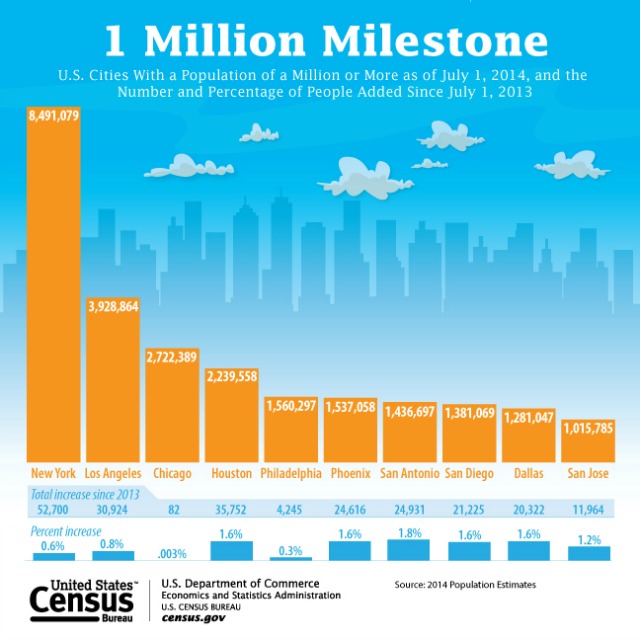Chicago's Population Grew Last Year—By 82
By Jim Bochnowski in News on May 21, 2015 8:40PM

U.S. Census Bureau
Chicago has retained its position as the third-largest city in America, but somehow its population only grew by 82—yes, 82 individual people—last year.
The Census Bureau released new data Thursday on America's largest cities, which confirmed that Chicago only saw its population grow by 0.003 percent from July 2013 to July 2014. Again, that's 82 whole people.
Chicago's stagnant growth is especially noticeable when you compare it to America's other largest cities. In the same time period New York grew by 0.6 percent and Los Angeles grew by 0.8 percent. Houston, the fourth-largest city, saw a 1.6 percent increase in population over the last year, with a population of 2,239,558.
Since the 2010 census, Chicago has seen a population gain of roughly 1 percent, which is the sixth-slowest increase among the fifty largest cities in America. Only Milwaukee, Memphis, Baltimore, Cleveland and Detroit logged lower population growth numbers.
According to Rob Paral, a Chicago-based demographer, the city's largest boom took place in the '90s:
"The boom of Chicago in the 1990s was due to immigration. You take away that catalyst of immigration, and you see what we have. They're going to different parts of the country, and there's much less immigration to the U.S. than there was decades ago. Texas, as an example, has been a magnet for a lot of lower-paying jobs and has the benefit of lower housing costs. If you're making $15 an hour, the difference between making it where a house costs $100,000 and $300,000 is great."
The Chicago Metropolitan Agency for Planning released a study of Chicago's population trends Thursday, and noted that "while the region's population growth has begun to recover from recessionary lows, that growth substantially lags peer regions."
The study also showed that the Chicagoland area's "growth in many key industries is behind our peer regions. While this analysis does not attribute a causal relationship between the region's economic and demographic trends, growth that is lagging compared to competitive regions indicates a challenge that must be addressed by the region as a whole."
In short, if you want more people to move to Chicago, you have to give them a reason to come here. After all, we don't want to lose our position as America's third-largest city to Houston, do we?